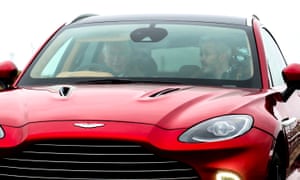Outbreak could hit supply chain and sales of carmaker, whose financial chief is to leave

Prince Charles (left) drives the company’s first SUV, the Aston Martin DBX, during his visit to its new manufacturing plant in St Athan, Wales.
Photograph: Chris Jackson/Getty Images
Aston Martin’s losses widened in 2019 as sales fell and it warned of possible disruption from the coronavirus outbreak, underlining the struggling carmaker’s need for a bailout led by the fashion mogul Lawrence Stroll.
The luxury sports car manufacturer also announced on Thursday that its chief financial officer, Mark Wilson, will step down by the end of April, after a year that left the company facing a cash crunch that threatened to push it into bankruptcy for the eighth time in its 107-year history.
Shares fell 6% to a record low of 367p after Astin Martin said losses before tax rose to £104m in the year to 31 December 2019, a 53% increase year on year. Revenues slumped by 9%, to £997m, matching a decline in sales.
Aston Martin expects “materially lower” sales in 2020 as it tries to reduce the number of cars held by dealers and it also warned that the Covid-19 coronavirus outbreak could hit its supply chain and sales.
The carmaker said it had suffered disruption to some components in China but added that it had secured a supply until the end of March. However, the bigger worry for some analysts is the effect on sales in the key Chinese market, particularly as it launches its new, make-or-break SUV, the DBX.
Q&A
How can I protect myself from the coronavirus outbreak?
The World Health Organization is recommending that people take simple precautions to reduce exposure to and transmission of the Wuhan coronavirus, for which there is no specific cure or vaccine.
The UN agency advises people to:
- Frequently wash their hands with an alcohol-based hand rub or warm water and soap
- Cover their mouth and nose with a flexed elbow or tissue when sneezing or coughing
- Avoid close contact with anyone who has a fever or cough
- Seek early medical help if they have a fever, cough and difficulty breathing, and share their travel history with healthcare providers
- Avoid direct, unprotected contact with live animals and surfaces in contact with animals when visiting live markets in affected areas
- Avoid eating raw or undercooked animal products and exercise care when handling raw meat, milk or animal organs to avoid cross-contamination with uncooked foods.
Despite a surge in sales of face masks in the aftermath of the outbreak of the coronavirus outbreak, experts are divided over whether they can prevent transmission and infection. There is some evidence to suggest that masks can help prevent hand-to-mouth transmissions, given the large number of times people touch their faces. The consensus appears to be that wearing a mask can limit – but not eliminate – the risks, provided they are used correctly.
Aston Martin said: “Covid-19 has the potential to impact both the supply chain and customer demand in China and other markets. China was the company’s fastest-growing market in 2019 and represented 9% of total wholesales.”
The share issue led by Stroll, the Canadian billionaire who backed fashion brands such as Michael Kors, is “fully committed and underwritten” at £4 per share, the carmaker also announced, despite Aston Martin’s share price falling below that level since the bailout was announced at the end of January. Aston Martin shares floated at £19. The share issue and a £182m cash injection from Stroll aim to raise £500m in total.
Andy Palmer, Aston Martin’s chief executive, said: “2019 was an extremely challenging period for the company. While retail sales grew, we were unable to generate the revenue and profits we had originally planned.
“We have revised our business plan to reset, stabilise and de-risk the business, positioning it for controlled, long-term profitable growth.”
Aston Martin also took a £39m impairment after pausing work on the Rapide E, its first all-electric car. While work is “substantially complete” and the launch had been due in 2020, the company chose to delay its electric vehicle investments until 2025 in order to conserve cash.